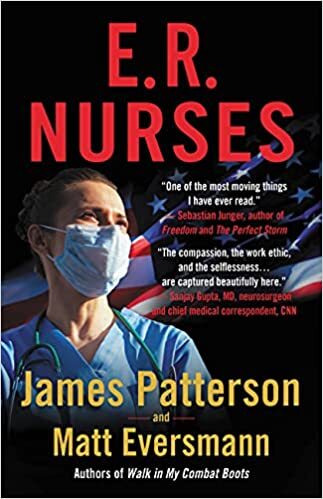E.R. Nurses: by James Patterson & Matt Eversmann
I have always been fascinated by science and medicine, so much so that after my children were born and my youngest was ready to spend mornings with other children at daycare, I went back to school, studied and became a Registered Nurse. During my last semester, I did what is called an Externship. I worked on medical-surgical units to get more experience.
As my graduation drew near, the nurse recruiter urged me to apply for a position in one of those units. I thanked her, stressing that I wanted to work in Maternal-Child. She smiled, said there was no way anyone would hire me right out of nursing school. But s he was wrong. All along I had been reading Nursing Journals, studying the lists of available positions when they were listed. Just before my graduation, it was right there waiting for me, openings in Maternal Child at Mercy Hospital.
I applied, did an interview and secured a position, the hospital in downtown Chicago, a commute I could manage. There were other new recruits that started with me, some having chosen different specialties. Mercy spent 14 days orienting us to hospital policy, the layout of the hospital and specifics as to how the different departments functioned. Then we were tested, and that took another two weeks, before we were assigned and dismissed to our units.
WORKING WITH A PRACTICED RN
The first day, I met my preceptor, Julie, an experienced nurse who guided my every move, provided encouragement when I had to start my first IV, learn how to interpret fetal monitoring strips, perform internal exams, and eventually work in the delivery room as both a scrub or circulating nurse. Julie was honest and encouraging, practiced and patient. Mercy was a tertiary care center at that time, a teaching hospitals for doctors, so we also learned how to work with interns and residents, who were often just as nervous and uncertain as we were.
SCUT WORK AND ARGUMENTS
My time in Labor and Delivery had its rewarding moments and its stressful shifts, an intern complaining I hadn’t responded as quickly as he wanted, an argument with a resident about a patient’s temperature, which he wanted to ignore, but I knew indicated a serious change in the patient’s condition. He finally listened, called his attending. But I wouldn’t change any of it.
And when I wasn’t working the 3-11 shift, I made sure I watched every episode of ER!
SO MANY OF US ARE FASCINATED
Medicine and the work of saving a life, bringing a baby into the world, fighting a stubborn disease, saving a patient from a bullet wound, broken bones or a devastating disease has always been of interest to writers, actors and the people that read or watch the distillation of how hospitals, science and medicine are part of the drama of life.
Think: Chicago Hope, Chicago Med, ER, Grey’s Anatomy (based on a major textbook that physicians read in medical school), The Resident, New Amsterdam, The Good Doctor, St. Elsewhere, Private Practive–to name a few. (I’ve watched them all!) Now James Patterson, author of more than 200 novels, recently published a book honoring nurses. He partnered with Matt Eversmann, a retired army vet, who also worked with Patterson writing, WALK IN MY COMBAT BOOTS.
The book is entitled: E.R. NURSES and is divided into DAY SHIFT, NIGHT SHIFT, FLIGHT SHIFT and THANK YOU. The two authors interviewed nurses from across the country, nurses who often started in different jobs or positions, some in healthcare, but finally found that the desire to save lives was the most rewarding path they could follow.
Liz Martinez: They perform a thoracotomy, which is where you cut open the patient’s chest on the left side to gain rapid access the heart. It’s done only in a dire situation—it’s a heroic medical Hail Mary.
Kellie Travers: And if it’s a full moon? We’re flooded with crazy people and women in labor. (This is true!)
Andrew Festa: I want to give my patients hope. “Every case is different, so it’s difficult to say.” We had to put him on a vent. He dies later that evening. Sometimes hope is all we have.
Honna Vanhoozier: The great thing about nursing is that when your shift is over, you don’t take home anything physical. I don’t have reports or files or, like teachers, papers to grade. When I leave, I don’t think or dwell on things that happened that day…If something really bad happens, I talk with my work friends, who are like counselors. I can bounce things off them because they understand, and then after a couple of day, I move on.
Claire: I think about the man who committed suicide and the young woman who was brutally raped; of the patients who have died. Dealing with loss and tragedy day after day–I know it won’t get any easier no matter how long I do this work. There will always be cases that will get me because this is an emotional job. But this woman who just thanked me–it’s moments like these that make me and other nurses do what we do. We all want to make a difference for someone who needs it.
Thanks for reading. Please comment if you have had an experience with a nurse that you would like to share. Hopefully, it will be a positive one.
Facebook Twitter LinkedInPinterest




